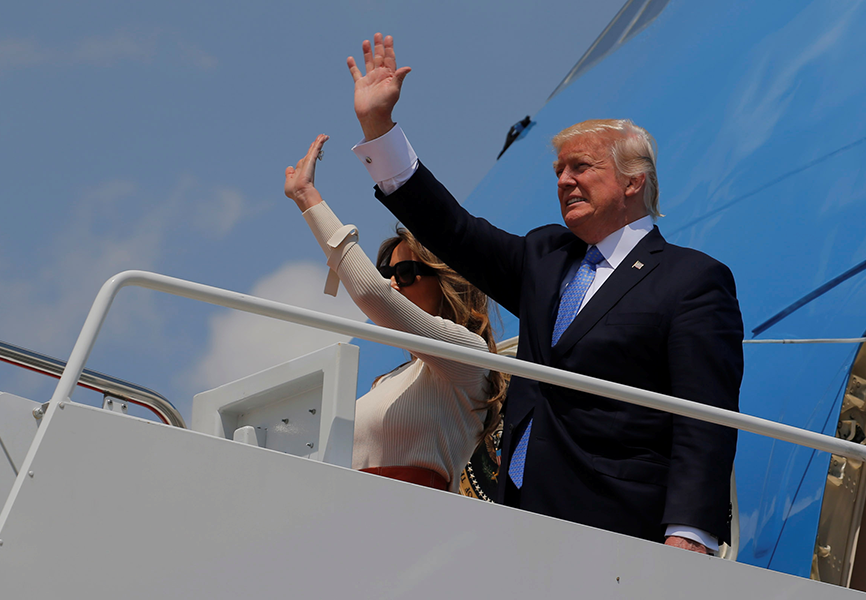When president trump touches down in Riyadh, one meeting will stand out
Before you finish this piece, there will likely be another bombshell out of the Trump Administration. The nonstop barrage of developments is enough to make one 'mildly nauseous.'
But amongst the shuffle is the president's first foreign trip -- and the stakes have never been higher. Trump's timing and choice of destinations – like many things about his presidency – are unusual. His four most recent predecessors made their first trip to Mexico or Canada, and three of the four did so in February. Trump has waited until May, and chosen to visit allies in the Middle East first, amid tensions with Canada and Mexico over NAFTA re-negotiation.
What does it mean that Trump is heading to Saudi Arabia first? It is, of course, a Muslim nation -- a religion that Trump one stated during the campaign "hates" Americans. But despite the the hyperbole, both nations are looking to start anew. This trip is a statement that Obama's policy of disengagement or retrenchment in the Middle East is over, and it means that Trump ready to begin tightening the screws on Iran. If all goes well, he may clinch an alliance that is much more hawkish towards that nation. It is no mystery that Trump's priority in the Middle East is the Islamic State, and he has already started sending troops into Raqqa. The visit also signifies the beginning of increased trade relations with Saudi Arabia, in addition to more economic partnership, and more arms agreements--which are sure to be signed very soon.
The most important face-to-face meeting in this first leg of Trump's trip will be with Deputy Crown Prince Mohammed bin Salman. He is the King's son and effectively the decision maker in Saudi Arabia. All the decisions we have seen coming out of the Kingdom: the economic reforms, the oil strategy, and the changes in the social contract, are of his making. He has ambitious plans: to advance reform, to change the Kingdom as an institution, and to use these reforms to ultimately become the next ruler of Saudi Arabia.
The relationship between Mohammed bin Salman and President Trump is going to be critical going forward. It will build trust between the leaders and enable them to shape the alliance between both nations. There is little doubt that Trump is going to support the young prince in his effort to rise to become King. And in doing so, Bin Salman will likely move forward with liberalizing the economy and creating further business opportunities for US economies.
The meeting in Riyadh could very well be the start of it all. As long, that is, as Trump's domestic woes don't get in the way first.
Ayham Kamel is a director in Eurasia Group's Middle East and North Africa practice
Jon Lieber, U.S. practice head, contributed to this article
Alex Gibson, digital editor, edited this article and produced the accompanying video
Ayham Kamel leads coverage of regional geopolitics, Iraq, and the Levant area (Syria, Jordan, and Lebanon). His worked focuses on the US role in the Middle East, Iran-Saudi Arabia relations, energy policy, the Islamic State, and risks of financial instability in the region.

 U.S. President Donald Trump and first lady Melania Trump board Air Force One for his first international trip as president, including stops in Saudi Arabia, Israel, the Vatican, Brussels and at the G7 summit in Sicily, from Joint Base Andrews, Maryland, U.S. May 19, 2017. REUTERS/Jonathan Ernst
U.S. President Donald Trump and first lady Melania Trump board Air Force One for his first international trip as president, including stops in Saudi Arabia, Israel, the Vatican, Brussels and at the G7 summit in Sicily, from Joint Base Andrews, Maryland, U.S. May 19, 2017. REUTERS/Jonathan Ernst